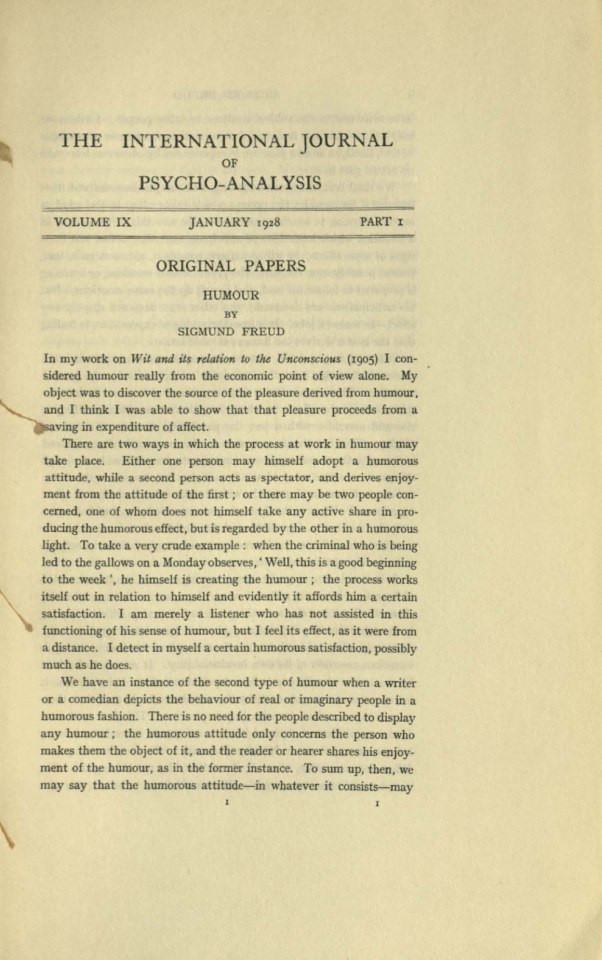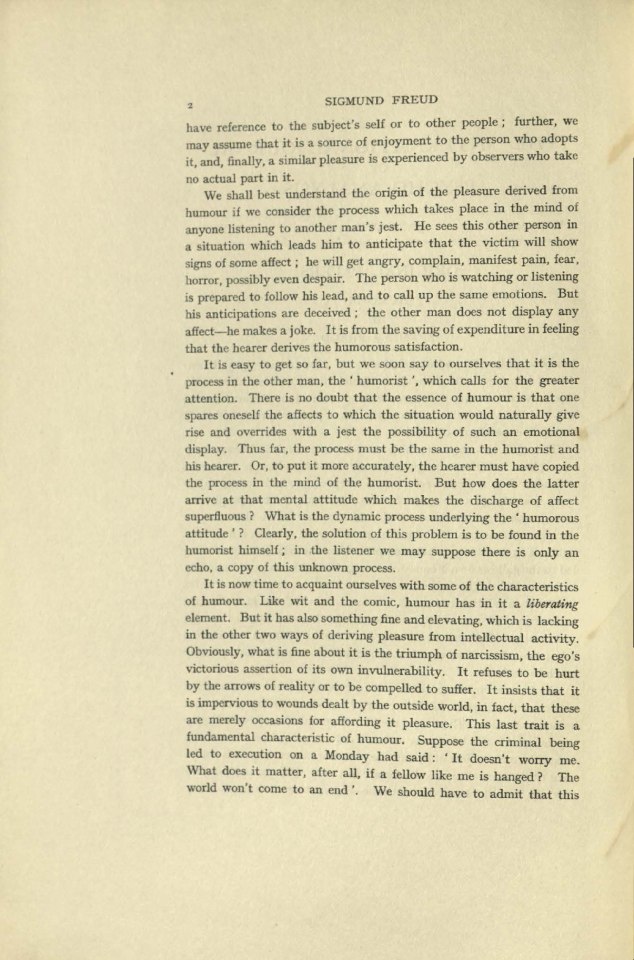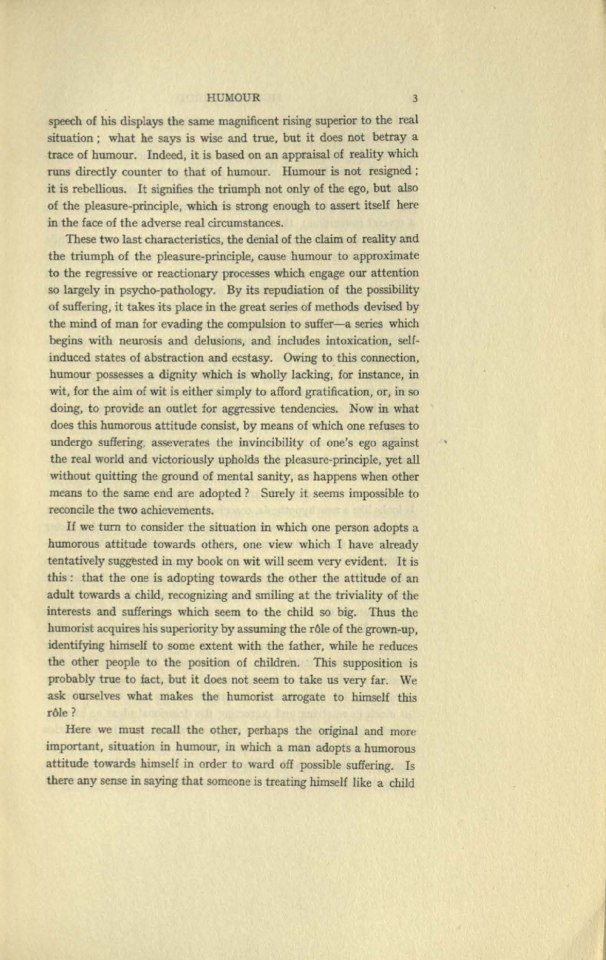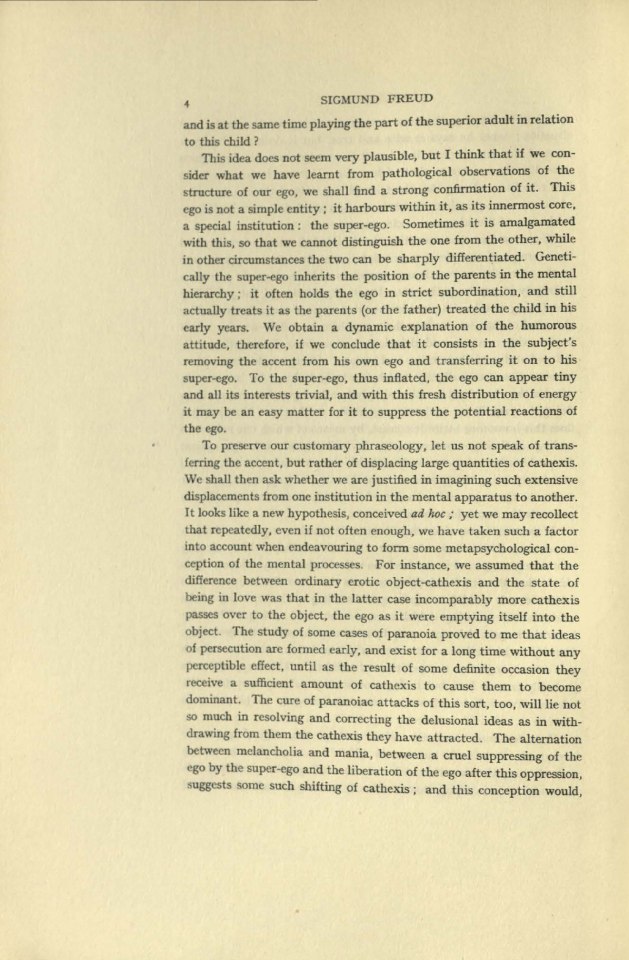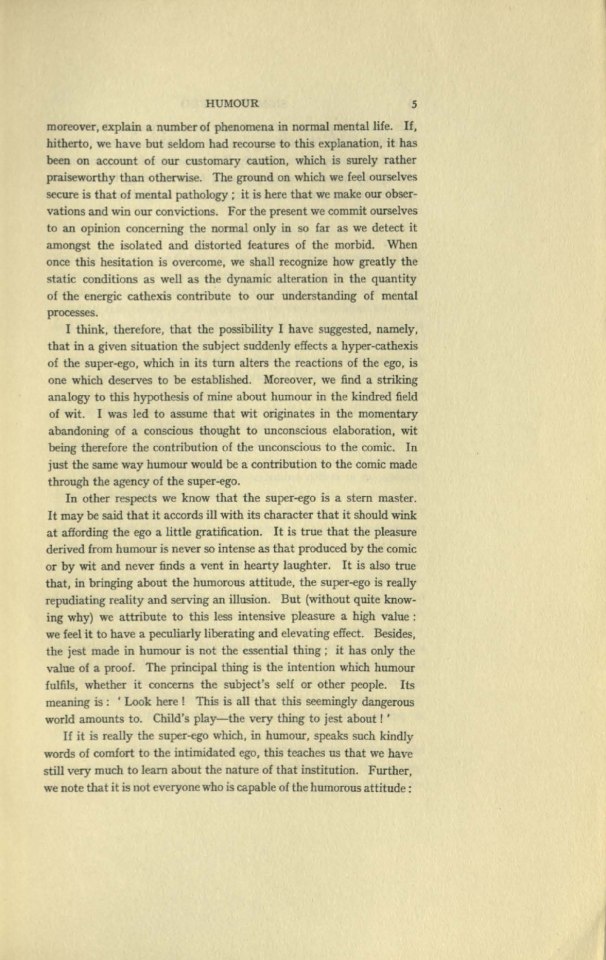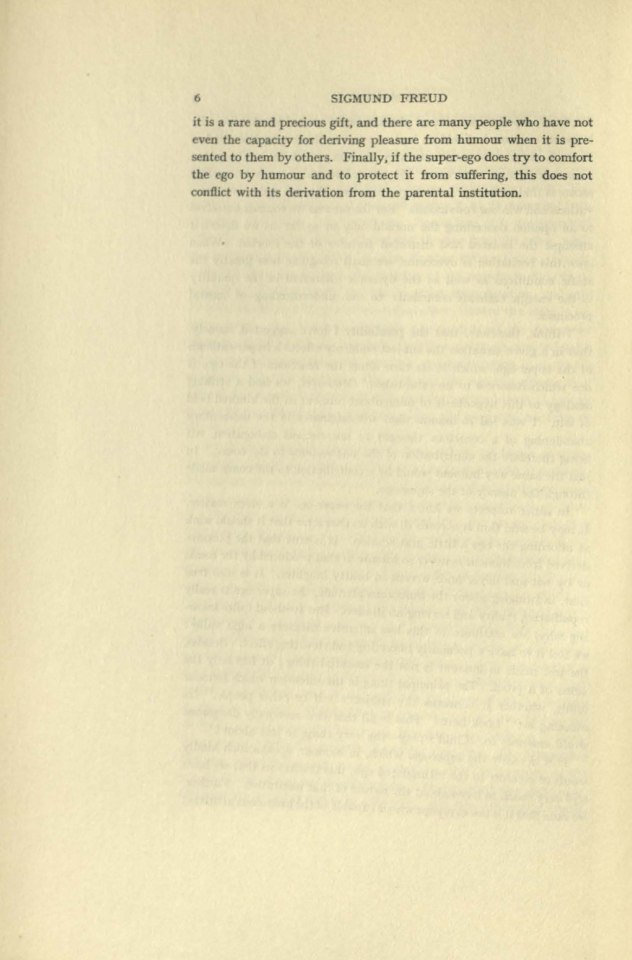S.
、
THE INTERNATIONAL JOURNAL
OF
PSYCHO-ANALYSISVOLUME IX JANUARY 1928 PART I
ORIGINAL PAPERS
HUMOUR
BY
SIGMUND FREUDIn my work on Wit and its relation to the Unconscious (1905) I con- |
sidered humour really from the economic point of view alone. My
object was to discover the source of the pleasure derived from humour,
and I think I was able to show that that pleasure proceeds from a
ving in expenditure of affect.There are two ways in which the process at work in humour may
take place. Either one person may himself adopt a humorous
attitude, while a second person acts as spectator, and derives enjoy-
ment from the attitude of the first ; or there may be two people con-
cerned, one of whom does not himself take any active share in pro-
ducing the humorous effect, but is regarded by the other in a humorous
light. To take a very crude example : when the criminal who is being
led to the gallows on a Monday observes, * Well, this is a good beginning
to the week ', he himself is creating the humour ; the process works
itself out in relation to himself and evidently it affords him a certain
satisfaction. I am merely a listener who has not assisted in this
functioning of his sense of humour, but I feel its effect, as it were from
a distance. I detect in myself a certain humorous satisfaction, possibly
much as he does.We have an instance of the second type of humour when a writer
or a comedian depicts the behaviour of real or imaginary people in a
humorous fashion. There is no need for the people described to display
any humour; the humorous attitude only concerns the person who
makes them the object of it, and the reader or hearer shares his enjoy-
ment of the humour, as in the former instance. To sum up, then, we
may say that the humorous attitude—in whatever it consists—may1 1
S.
H SIGMUND FREUD
have reference to the subject's self or to other people; further, we
may assume that it is a source of enjoyment to the person who adopts
it, and, finally, a similar pleasure is experienced by observers who take
no actual part in it.We shall best understand the origin of the pleasure derived from
humour if we consider the process which takes place in the mind of
anyone listening to another man's jest. He sees this other person in
a situation which leads him to anticipate that the victim will show
signs of some affect ; he will get angry, complain, manifest pain, fear,
horror, possibly even despair. The person who is watching or listening
is prepared to follow his lead, and to call up the same emotions. But
his anticipations are deceived ; the other man does not display any
affect—he makes a joke. It is from the saving of expenditure in feeling
that the hearer derives the humorous satisfaction.It is easy to get so far, but we soon say to ourselves that it is the
process in the other man, the ' humorist ', which calls for the greater
attention. There is no doubt that the essence of humour is that one
spares oneself the affects to which the situation would naturally give
rise and overrides with a jest the possibility of such an emotional
display. Thus far, the process must be the same in the humorist and
his hearer. Or, to put it more accurately, the hearer must have copied
the process in the mind of the humorist. But how does the latter
arrive at that mental attitude which makes the discharge of affect
superfluous? What is the dynamic process underlying the * humorous
attitude'? Clearly, the solution of this problem is to be found in the
humorist himself; in the listener we may suppose there is only an
echo, a copy of this unknown process.It is now time to acquaint ourselves with some of the characteristics
of humour. Like wit and the comic, humour has in it a liberating
element, But it has also something fine and elevating, which is lacking
in the other two ways of deriving pleasure from intellectual activity.
Obviously, what is fine about it is the triumph of narcissism, the ego's
victorious assertion of its own invulnerability. It refuses to be hurt
by the arrows of reality or to be compelled to suffer. It insists that it
is impervious to wounds dealt by the outside world, in fact, that these
are merely occasions for affording it pleasure. This last trait is a
fundamental characteristic of humour. Suppose the criminal being
led to execution on a Monday had said: “It doesn’t worry me.
ne TY kø red if = fellow like me is hanged ? The. e should have to admit that this
S.
HUMOUR 3
speech of his displays the same magnificent rising superior to the real
situation ; what he says is wise and true, but it does not betray a
trace of humour. Indeed, it is based on an appraisal of reality which
runs directly counter to that of humour. Humour is not resigned ;
it is rebellious. It signifies the triumph not only of the ego, but also
of the pleasure-principle, which is strong enough to assert itself here
in the face of the adverse real circumstances.These two last characteristics, the denial of the claim of reality and
the triumph of the pleasure-principle, cause humour to approximate
to the regressive or reactionary processes which engage our attention
so largely in psycho-pathology. By its repudiation of the possibility
of suffering, it takes its place in the great series of methods devised by
the mind of man for evading the compulsion to suffer—a series which
begins with neurosis and delusions, and includes intoxication, self-
induced states of abstraction and ecstasy. Owing to this connection,
humour possesses a dignity which is wholly lacking, for instance, in
wit, for the aim of wit is either simply to afford gratification, or, in so
doing, to provide an outlet for aggressive tendencies. Now in what
does this humorous attitude consist, by means of which one refuses to
undergo suffering, asseverates the invincibility of one’s ego against
the real world and victoriously upholds the pleasure-principle, yet all
without quitting the ground of mental sanity, as happens when other
means to the same end are adopted ? Surely it seems impossible to
reconcile the two achievements.If we turn to consider the situation in which one person adopts a
humorous attitude towards others, one view which I have already
tentatively suggested in my book on wit will seem very evident. Itis
this: that the one is adopting towards the other the attitude of an
adult towards a child, recognizing and smiling at the triviality of the
interests and sufferings which seem to the child so big. Thus the
humorist acquires his superiority by assuming the rôle of the grown-up,
identifying himself to some extent with the father, while he reduces
the other people to the position of children. This supposition is
probably true to fact, but it does not seem to take us very far. We
ask ourselves what makes the humorist arrogate to himself this
rôle ?Here we must recall the other, perhaps the original and more
important, situation in humour, in which a man adopts a humorous
attitude towards himself in order to ward off possible suffering. Is
there any sense in saying that someone is treating himself like a childS.
4 SIGMUND FREUD
and is at the same time playing the part of the superior adult in relation
to this child ?This idea does not seem very plausible, but I think that if we con-
sider what we have learnt from pathological observations of the
structure of our ego, we shall find a strong confirmation of it. This
ego is not a simple entity ; it harbours within it, as its innermost core,
a special institution : the super-ego. Sometimes it is amalgamated
with this, so that we cannot distinguish the one from the other, while
in other circumstances the two can be sharply differentiated. Geneti-
cally the super-ego inherits the position of the parents in the mental
hierarchy ; it often holds the ego in strict subordination, and still
actually treats it as the parents (or the father) treated the child in his
early years. We obtain a dynamic explanation of the humorous
attitude, therefore, if we conclude that it consists in the subject`s
removing the accent from his own ego and transferring it on to his
super-ego. To the super-ego, thus inflated, the ego can appear tiny
and all its interests trivial, and with this fresh distribution of energy
it may be an easy matter for it to suppress the potential reactions of
the ego.To preserve our customary phraseology, let us not speak of trans-
ferring the accent, but rather of displacing large quantities of cathexis.
We shall then ask whether we are justified in imagining such extensive
displacements from one institution in the mental apparatus to another.
It looks like a new hypothesis, conceived ad hoc ; yet we may recollect
that repeatedly, even if not often enough, we have taken such a factor
into account when endeavouring to form some metapsychological con-
ception of the mental processes. For instance, we assumed that the
difference between ordinary erotic object-cathexis and the state of
being in love was that in the latter case incomparably more cathexis
passes over to the object, the ego as it were emptying itself into the
object. The study of some cases of paranoia proved to me that ideas
of persecution are formed early, and exist for a long time without any
perceptible effect, until as the result of some definite occasion they
receive a sufficient amount of cathexis to cause them to become
dominant. The cure of paranoiac attacks of this sort, too, will lie not
so much in resolving and correcting the delusional ideas as in with-
drawing from them the cathexis they have attracted. The alternation
between melancholia and mania, between a cruel suppressing of the
ego by the super-ego and the liberation of the ego after this oppression,
suggests some such shifting of cathexis; and this conception would,S.
HUMOUR 5
moreover, explain a number of phenomena in normal mental life. If,
hitherto, we have but seldom had recourse to this explanation, it has
been on account of our customary caution, which is surely rather
praiseworthy than otherwise. The ground on which we feel ourselves
secure is that of mental pathology ; it is here that we make our obser-
vations and win our convictions. For the present we commit ourselves
to an opinion concerning the normal only in so far as we detect it
amongst the isolated and distorted features of the morbid. When
once this hesitation is overcome, we shall recognize how greatly the
static conditions as well as the dynamic alteration in the quantity
of the energic cathexis contribute to our understanding of mental
processes,I think, therefore, that the possibility I have suggested, namely,
that in a given situation the subject suddenly effects a hyper-cathexis
of the super-ego, which in its turn alters the reactions of the ego, is
one which deserves to be established. Moreover, we find a striking
analogy to this hypothesis of mine about humour in the kindred field
of wit. I was led to assume that wit originates in the momentary
abandoning of a conscious thought to unconscious elaboration, wit
being therefore the contribution of the unconscious to the comic. In
just the same way humour would be a contribution to the comic made
through the agency of the super-ego.In other respects we know that the super-ego is a stern master.
It may be said that it accords ill with its character that it should wink
at affording the ego a little gratification. It is true that the pleasure
derived from humour is never so intense as that produced by the comic
or by wit and never finds a vent in hearty laughter. It is also true
that, in bringing about the humorous attitude, the super-ego is really
repudiating reality and serving an illusion. But (without quite know-
ing why) we attribute to this less intensive pleasure a high value:
we feel it to have a peculiarly liberating and elevating effect. Besides,
the jest made in humour is not the essential thing ; it has only the
value of a proof. The principal thing is the intention which humour
fulfils, whether it concerns the subject's self or other people. Its
meaning is: ‘ Look here! This is all that this seemingly dangerous
world amounts to. Child's play—the very thing to jest about | "If it is really the super-ego which, in humour, speaks such kindly
words of comfort to the intimidated ego, this teaches us that we have
still very much to learn about the nature of that institution. Further,
we note that it is not everyone who is capable of the humorous attitude :S.
6 SIGMUND FREUD
it is a rare and precious gift, and there are many people who have not
even the capacity for deriving pleasure from humour when it is pre-
sented to them by others. Finally, if the super-ego does try to comfort
the ego by humour and to protect it from suffering, this does not
conflict with its derivation from the parental institution.
ijp_ix_1928_1
1
–6
Die vorliegende Übersetzung unterliegt bis 2032 dem Urheberrechtsschutz. Die Veröffentlichung erfolgt mit freundlicher Genehmigung des International Psychoanalytic Journals.
